2023 Cannes Film Festival Recap & Reviews
Written by on May 29, 2023
Updated May 28
A return to form
Last year’s Cannes was universally regarded as one of the weakest lineups in the recent history of the storied festival. But the just-concluded 76th installment proved that downturn to be a one-year aberration: This year’s festival was filled with highlights.
A jury led by Ruben Östlund (director of last year’s relatively underwhelming Palme d’Or winner Triangle of Sadness) named the French drama Anatomy of a Fall the best film of the 2023 Festival de Cannes—in the process, making director Justine Triet just the third woman to win the Palme d’Or in Cannes history. (The previous such winner, Julia Ducournau, was also on the Cannes jury this year.) But Fall was just one of many buzzy, high-scoring films that debuted at this year’s fest. Even an Indiana Jones-sized disappointment didn’t take away from a strong lineup featuring compelling new works by Martin Scorsese, Jonathan Glazer, Hirokazu Koreeda, Todd Haynes, Wim Wenders, Nuri Bilge Ceylan, Aki Kaurismäki, and more.
So exactly which films at Cannes 76 managed to impress our critics? Below, we sample the critics’ responses to all of this year’s notable Cannes debuts (including out-of-competition premieres as well as titles screening at parallel festivals Directors’ Fortnight and Critics’ Week). We’ve divided the films into three categories—great, good, and everything else—based on the critical consensus. But before we get to those three groups, let’s dive into this year’s awards …
Major award winners
Palme d’Or (1st place):
Anatomy of a Fall (Anatomie d’une chute)
Drama/Thriller | France | Directed by Justine Triet
Acquired at Cannes by Neon for an undisclosed amount
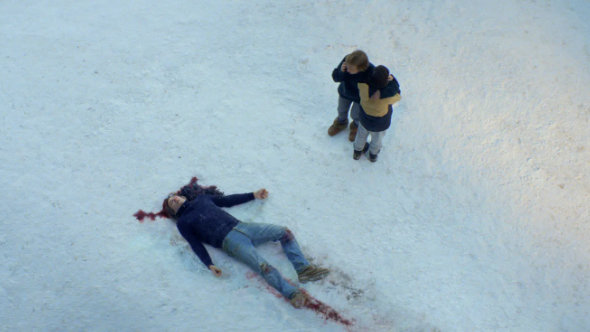
In 2019, French writer-director Justine Triet’s Sibyl played in the competition at Cannes. This year she returned with a courtroom drama co-written with her spouse, Arthur Harrari, the director of Onoda: 10,000 Nights in the Jungle and one of the leads in the well-received Director’s Fortnight film The Goldman Case. Sandra Hüller stars as Sandra, a writer living with her husband and visually impaired son in a remote mountain house. When her husband falls to his death, Sandra is put on trial for murder, and her son proves to be a key witness.
For The Telegraph’s Tim Robey it’s an “intellectual thriller of rare calibre, assembled so precisely and deepening so richly it continually takes your breath away,” Another rave comes from David Katz of The Film Stage, who calls it an “immensely enjoyable, idiosyncratic entertainment.” Writing for THR, Jon Frosh finds Fall “gripping and gratifyingly rich … part legal procedural, part portrait of a complicated woman, part snapshot of a marriage on the brink and part coming-of-age narrative.” And in her “A+” review for The Playlist, Elena Lazic declares it a “breathtakingly intelligent and subtly perverse masterpiece.”
Only two other woman-directed films have ever won the top prize at Cannes: The Piano (1993) from Jane Campion, and 2021’s Titane from Julia Ducournau.
Grand Prix (2nd place):
The Zone of Interest
Drama | USA/UK/Poland | Directed by Jonathan Glazer
Will be released in theaters by A24 (date tbd)
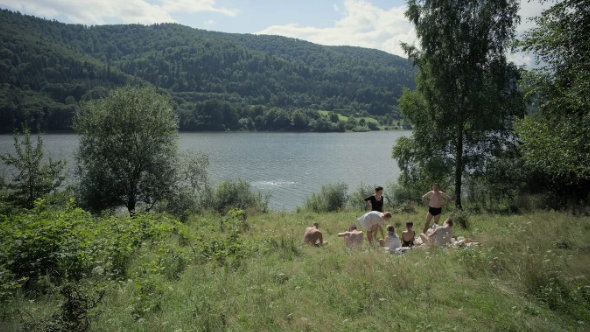
Jonathan Glazer’s fourth feature film in 23 years, following Sexy Beast, Birth, and Under the Skin, is an unconventional Holocaust drama that follows Auschwitz commandant Rudolf Höss (Christian Friedel), his wife Hedwig (Sandra Hüller—yes, she starred in both the top film and the runner-up), and their children as they go about their lives in their pristine villa just outside the walls of the concentration camp. To observe the family’s actions, Glazer embedded remote control cameras around a reconstructed version of the house, allowing cuts to happen as actors moved from room to room. Unlike the novel by Martin Amis (who died the same day as the film’s premiere) that very loosely inspired it, the film never enters the camp, instead allowing the soundtrack to hint at the horror taking place behind the walls.
For LA Times critic Justin Chang it’s an “implacably chilling, entirely mesmerizing portrait of a family living in the shadow of the inferno,” and Vulture’s Bilge Ebiri finds it “so psychologically searing it borders on the unwatchable.” Rory O’Connor of The Film Stage believes it’s a “shocking piece of audio-visual art that only further cements Glazer as one of the 21st century’s most original and influential filmmakers,” and BBC critic Nicolas Barber declares Glazer’s latest a “masterpiece: a great film, and a great work of art.”
Jury Prize (3rd place):
Fallen Leaves (Kuolleet lehdet)
Drama/Comedy | Finland | Directed by Aki Kaurismäki
Acquired at Cannes by MUBI (release details tbd)
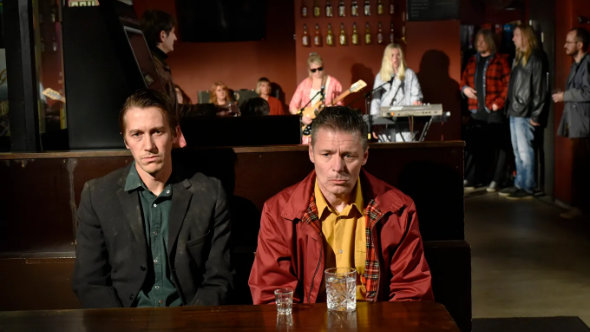
After taking home the Grand Jury Prize in 2002 for The Man Without a Past and competing in 2011 with Le Havre, Finnish filmmaker Aki Kaurismäki returned to the festival with this simple Helsinki-set love story about two lonely people, Ansa (Alma Poysti) and Holappa (Jussi Vatanen). It’s a “charming, moving, bittersweet romance packed with all the lovely things we’ve come to associate with him after four decades,” writes Rory O’Connor of The Film Stage. THR’s David Rooney finds it “slender but enormously satisfying,” and Dave Calhoun of TimeOut declares it a “low-key treat with moments of real bliss.” NY Times critic Manohla Dargis believes this “tender, beautifully directed love story” is a “perfect delight.” And IndieWire’s David Ehrlich adds, “Its faith in our ability to find light in the darkness never feels the least bit false or naive, because to watch this movie is to find it there too.”
More awards
Other major award winners at this year’s festival include:
Un Certain Regard
Selected by a separate jury (whose members included John C. Reilly, Alice Winocour, and Davy Chou, among others), the Un Certain Regard section was won by British director Molly Manning Walker‘s debut How to Have Sex, which follows three teens on an eventful vacation (more details below). The second-place Jury Prize was taken by The Hounds, a Casablanca-set crime drama from Moroccan director Kamal Lazraq, while documentarian Asmae El Moudir took home the directing prize for The Mother of All Lies.
Directors’ Fortnight
The independent parallel competition is technically non-competitive, but two awards are given out (by outside organizations rather than by the festival itself) nevertheless. Elena Martín’s debut Creatura was selected by Europa Cinemas as the best European film in that festival, while the SACD Prize (from France’s Writers’ Guild) for best French-language film went to Pierre Creton’s A Prince.
Critics’ Week and others
Another parallel competition, Critics Week is open to first- and second-time directors. One of those first-timers, Amanda Nell Eu, saw her darkly comedic coming-of-age/body horror drama Tiger Stripes awarded the competition’s Grand Prize by a jury led by director Audrey Diwan. The top prize in La Cinef (formerly known as Cinéfondation), which is open to current film students, went to Norwegian Offspring from Denmark’s Marlene Emilie Lyngstad. And no Cannes would be complete without the Palm Dog, whose top prize is awarded to the best canine actor to appear in any Cannes entry. The competition was esepcially fierce this year, with numerous festival films featuring meaty roles for four-legged actors, but border collie Messi proved to be the top dog with a showy performance as Snoop in Palme d’Or winner Anatomy of a Fall.
More Cannes standouts
About Dry Grasses (Kuru Otlar Üstüne)
Drama | Turkey/France/Germany | Directed by Nuri Bilge Ceylan
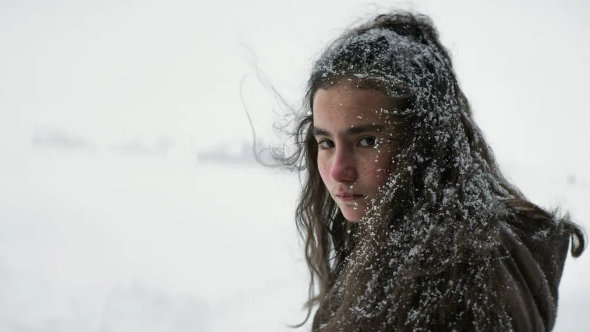
After winning the Palme d’Or in 2014 for Winter Sleep, Turkish writer-director Nuri Bilge Ceylan returned to Cannes in 2018 with The Wild Pear Tree. Five years later, he’s back with, in the words of Cinevue’s John Bleasdale, a “wonderful wintry meditation on male fragility and the way we often make our own hells and then deceive ourselves that we’re trapped.” The drama rotates around Samet, a young art teacher finishing his required service in a remote village and dreaming of returning to the city, but when Sevim, one of his students, accuses him of inappropriate behavior, his narcissism is laid bare. For Tomris Laffly of TheWrap, “it’s a searing, mesmerizing and unforgettably wintry mood piece and character study.” The Guardian’s Peter Bradshaw agrees it’s “another very absorbing movie from this unique director,” with “something engrossing in its garrulous and wide-ranging quality: a literary quality in fact.” Writing for Screen Daily, Lee Marshall adds, “About Dry Grasses is a ravishingly cinematic piece of work that seems designed to spark animated, if not acrimonious, debate.”
Anselm
Documentary | Germany | Directed by Wim Wenders
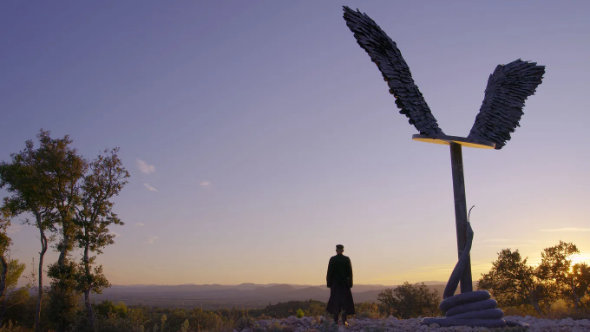
This documentary portrait of German painter-sculptor Anselm Kiefer was one of two films Wim Wenders (Pina, Buena Vista Social Club) debuted at this year’s Cannes—and both received a warm welcome from critics. Shot in 3D 6K over two years, it’s “one of those rare movies that’s actually enriched by the use of the format, and not an excuse for a gimmicky thrill ride for the easily amused or very young,” according to Leslie Felperin of THR. In her review for Variety, Catherine Bray declares it a “tour-de-force” both “rich in ideas and breathtaking in technical execution,” and Screen Daily critic Jonathan Romney praises Franz Lustig’s “marvelous” cinematography and its ability to convey the “textures, abrasive materiality and sheer scale of Kiefer’s often monumental creations.” The Guardian’s Peter Bradshaw believes this “film of great seriousness and severity” is a “superbly controlled and expressed film and its high seriousness about the nature and purpose of art really is invigorating.”
Close Your Eyes (Cerrar los ojos)
Drama | Spain/Argentina | Directed by Víctor Erice
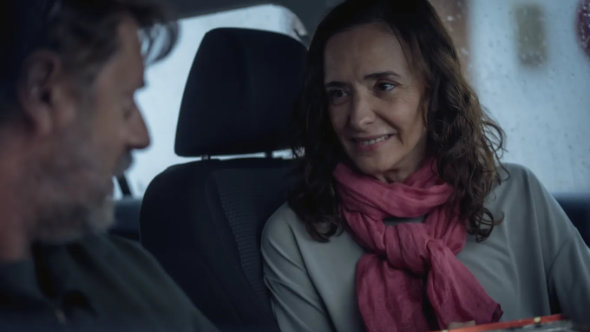
Although he won the Jury Prize in 1992 for Dream of Light, the first feature film in 31 years from 82-year-old Spanish director Víctor Erice (Spirit of the Beehive) did not play in competition at Cannes. Regardless, critics were impressed by this story of a film director haunted by the memory of his friend, a famous actor who disappeared while they were shooting a film together. It’s a “mysterious, digressive, long and baggily constructed film possessed of a distinctive richness and humanity, all about the balance between memory and forgetting which we all negotiate as we come to the end of our lives,” writes The Guardian critic Peter Bradshaw. David Katz of The Film Stage finds it “curious, self-referential, and rich,” and in his review for THR, Jordan Mintzer declares Eyes a “consummate work of filmmaking by a major artist.” Vulture’s Bilge Ebiri adds, “Erice’s fourth feature is a stirring tale about memory, identity, and friendship, and it feels deeply, almost alarmingly personal. … The final section of the picture asks, in mesmerizing and unbearably touching fashion, what really makes a life.”
The Delinquents (Los Delincuentes)
Drama/Comedy | Argentina | Directed by Rodrigo Moreno
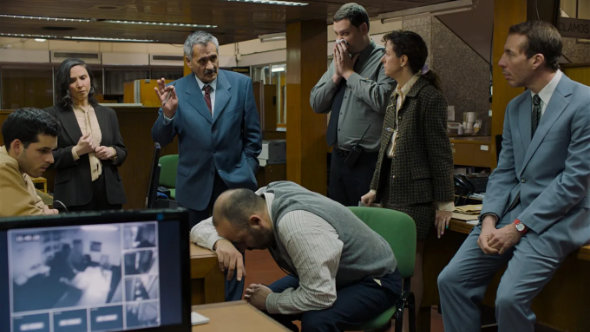
Argentinian writer-director Rodrigo Moreno begins his film with what critics are calling the most “banal,” “low-key,” and “laid-back” bank robbery ever put to screen. Morán (Daniel Elias) is the guilty party, but he has a plan: spend three years in jail so he never has to work again, as long as he can convince his coworker Román (Esteban Bigliardi) to hide the money for him. In his five-star review, The Guardian’s Peter Bradshaw suggests that The Delinquents “could be a cult classic,” describing it as if “Pedro Almodóvar and Eric Rohmer teamed up to compose a meanderingly long heist movie.” In The Playlist, Carlos Aguilar declares the film a “genius tragicomedy on the elusive nature of freedom,” and THR critic Jordan Mintzer promises it “offers many rewards” for “those willing to accept its meandering rhythms and puzzle-like structure.” Variety’s Jessica Kiang adds, “What is so beguiling about Moreno’s approach is that it’s a pretty much perfect example of formally committing to the thematic bit. At each creative juncture, the director selects the path less travelled, the one that leads furthest away from classic structure and formula.”
The Feeling That the Time for Doing Something Has Passed
Comedy | USA | Directed by Joanna Arnow
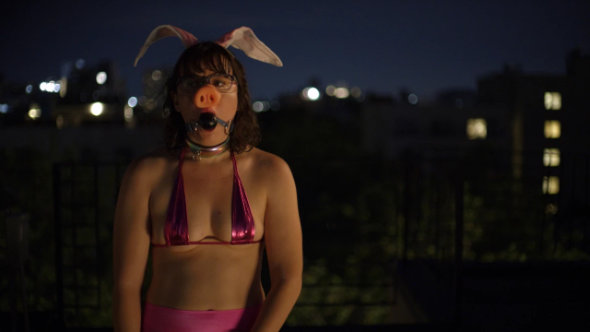
As she previously did for her celebrated shorts, Joanna Arnow writes, directs, edits, and stars in her feature debut (screening at the Director’s Fortnight) about a 30-something Jewish woman navigating power dynamics with her “sexfreinds,” family, and co-workers. “It’s a wonderfully distinctive debut by Arnow, who lays it all out in both her script and performance,” writes The Film Stage critic Rory O’Connor. THR’s Lovia Gyarkye believes “Arnow’s directorial debut plays with the mundanity of existence by extracting the most humorous moments from our daily interactions,” and Screen Daily critic Jonathan Romney likens it to a “bad dream but a painfully comic one.” In her review for Variety, Catherine Bray highlights the “other major star” of the film (its editing), writing, “It’s the unique rhythm of the way that this film is written and cut that elevates it beyond a standard millennial malaise movie.”
Four Daughters (Les filles d’Olfa)
Drama/Documentary | France/Tunisia/Germany/Saudi Arabia | Directed by Kaouther Ben Hania
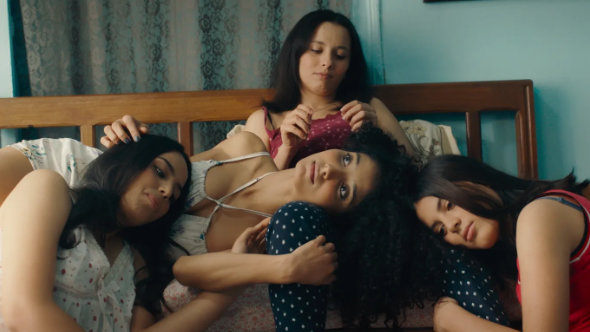
The latest from Tunisian writer-director Kaouther Ben Hania (The Man Who Sold His Skin, Beauty and the Dogs) is a formally daring look at a true story. Seven years ago, Olfa Hamrouni’s two eldest daughters left Tunisia to join ISIS. To explore why, Ben Hania casts professional actresses to play the two departed daughters, and they interact with Olfa’s remaining two real-life daughters and both Olfa herself and an actress playing Olfa. (Meanwhile, a single actor, Majd Mastoura, plays all of the male roles in the film.) Variety’s Jessica Kiang describes it as “neither fiction, nor documentary; neither memoir, nor reportage,” but “gripping” nonetheless. THR critic Lovia Gyarkye believes there’s a “tenderness to the whole enterprise;” it’s not “exploitative or manipulative” but “radical in its honesty and courage.” Wendy Ide of Screen Daily admits this “distinctive, daring and original work” prompts “prickly ethical questions,” but the surprising result is something “joyous, playful and in some ways even empowering.” Writing for Paste, Farah Cheded finds the “conceit at the heart of the film” to be “brilliant,” dissolving the “interpersonal barriers that might have prevented its subjects from total honesty,” and resulting in a “rare and deeply penetrating film.” Despite the filmmaker’s numerous dramatic liberties, Four Daughters actually won the Golden Eye prize as the festival’s best documentary (sharing the award with the Mother of All Lies).
The Goldman Case (Le Procès Goldman)
Drama | France | Directed by Cédric Kahn
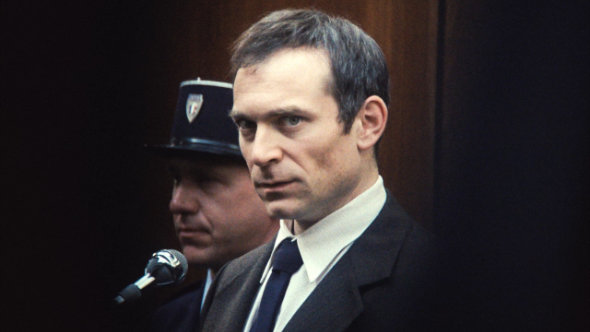
Actor, writer, director Cédric Kahn (The Prayer, Red Lights) takes the true story of the 1976 trial of Pierre Goldman, a far-left activist who admitted to four robberies but denied involvement in two deaths, and turns it into a “taut and rigorous piece of storytelling” that is “impeccably written and furiously acted,” according to Justin Chang of the LA Times. Arieh Worthalter leads the ensemble as Goldman and delivers a performance deemed “magnetic” by Screen Daily’s Fionnuala Halligan, who is impressed with what the film achieves in the “structured format” of a courtroom drama. In her review for IndieWire, Esther Zuckerman also praises Worthalter and the film’s “simplicity,” which allows Kahn to “underline the complexity of the circumstances and the prickly figure at its center,” as well as leave “his audience mired in the questions his story raises about Jewish trauma and corrupt institutions, both today and yesterday.”
How to Have Sex
Drama | UK/Greece | Directed by Molly Manning Walker
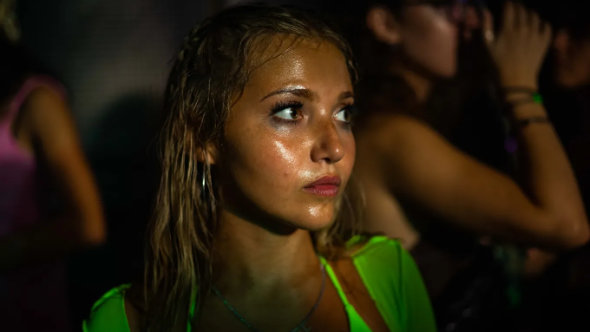
Molly Manning Walker’s Un Certain Regard-winning debut feature follows three British teenage girls (Mia McKenna Bruce, Enva Lewis, Lara Peake) on vacation in Greece, resulting in what Rafaela Sales Ross of The Playlist calls an “assured, fresh contribution to the recent array of promising British debuts.” In the words of THR critic Lovia Gyarkye, it’s a “quiet and stunning debut,” and for Robbie Collin of Telegraph it’s a “wonderful film” with the “tang and snap of the instant, lived-in moment.” Variety’s Guy Lodge believes McKenna Bruce gives a “star-making performance,” and Richard Lawson of Vanity Fair agrees: “Were How to Have Sex in the festival’s main competition and I were on the jury, McKenna-Bruce would have my best actress vote; it’s a stunning performance, subtle and complicated.”
Inside the Yellow Cocoon Shell
Drama | Vietnam/France/Singapore | Directed by Thien An Pham
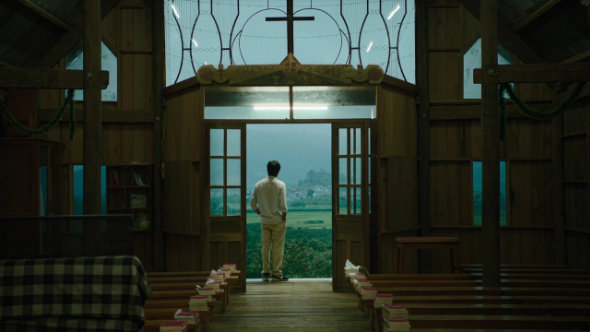
Thien An Pham took home the Camera d’Or for best first feature for this three-hour epic about a man taking his sister-in-law’s remains to her family village while caring for his five-year-old nephew. Writing for IndieWire, Josh Slater-Williams declares Shell a “spellbinding tale of the soul’s unfathomable desire for the other-worldly, that does itself border on transcendental in its filmmaking and gradual blurring of apparent truth and suggested fantasy.” Variety’s Guy Lodge is similarly impressed, writing, “This is challenging but seductive art cinema that invites comparisons to such titans as Apichatpong Weerasethakul, Tsai Ming-liang and even Theo Angelopoulos, without feeling derivative of any.” Screen Daily critic Allan Hunter believes this “remarkable” debut feature shows a “director in command of his storytelling,” resulting in something “provocative, absorbing and mysterious.”
Killers of the Flower Moon
Drama/Thriller | USA | Directed by Martin Scorsese
Opens in theaters October 6 via Paramount Pictures (and streams on Apple TV+ date tbd)
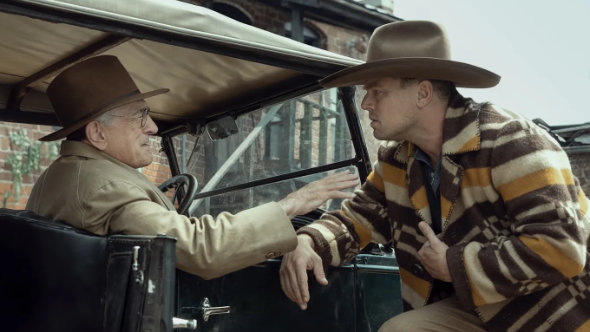
Martin Scorsese’s adaptation (co-written with Eric Roth) of David Grann’s book about the murders of members of the oil-rich Osage Nation in 1920s Oklahoma focuses more on the divided loyalties of Leonardo DiCaprio’s Ernest Burkhart, the nephew of wealthy cattle rancher Bill “King” Hale (Robert DeNiro) and husband of Lily Gladstone’s Mollie Kyle, than the subsequent investigation. Nevertheless, the lengthy film has a long list of fans following its Cannes unveiling. For NME’s Lou Thomas, it’s “among Scorsese’s most important work,” with a highlight being the “remarkable sensitivity in the disintegration of Ernest and Mollie’s relationship.” Slashfilm’s Lex Briscuso sees a “brilliant film aching to teach us something meaningful about all the desperate ways we engage with one another, for better or for worse.” Tomris Laffly of TheWrap finds Flower Moon “vast and vital in its scale, purpose and emotional scope, a Western-thriller and ensemble piece that is every bit a Scorsese crime picture as one can dare to imagine.” And TimeOut critic Phil de Semlyen believes this “true-crime epic is impeccably constructed and utterly gripping” and is “so richly entertaining, its three hours and 26 minutes whip by in a blur.”
La chimera
Comedy/Drama | France/Switzerland | Directed by Alice Rohrwacher
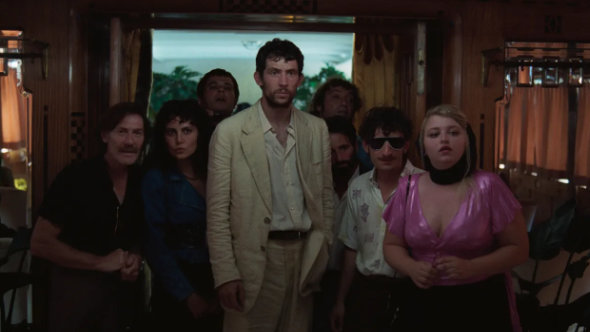
Having already won the Grand Jury Prize in 2014 for The Wonders and Best Screenplay in 2018 for Happy as Lazzaro, writer-director Alice Rohrwacher returned to Cannes with another bracingly original film set in Tuscany, this time in the 1980s. Josh O’Connor stars as Arthur, an archaeologist and dowser who emerges from jail dreaming of his lost love, Beniamina, eventually joining a group of “tombaroli” (grave robbers) in search of Etruscan artifacts. Shot in multiple formats (35mm, 16mm and Super 16) by Hélène Louvart, it’s a “marvelously supple and sinuous new film,” in which Rohrwacher “offers all her earthly and otherworldly preoccupations in scattered, bejeweled fragments, for us to gather and assemble and interpret — and doesn’t much mind if some pieces stay buried,” writes Guy Lodge of Variety. For The Guardian’s Peter Bradshaw, it’s a “beguiling fantasy-comedy of lost love: garrulous, uproarious and celebratory in her absolutely distinctive style.” Tomris Laffly of TheWrap deems La chimera a “rich and humorous folk tale overflowing with cultural details, aesthetic pleasures and the effervescent musicality of the Italian language.” IndieWire’s David Ehrlich highlights “O’Connor’s exquisite performance,” as does THR critic David Rooney, who describes his “affecting performance, floating between open-heartedness and fatalism, between the comforting escape of dreams and the sadness of reality.”
May December
Drama | USA | Directed by Todd Haynes
Acquired at Cannes by Netflix for a reported $11 million
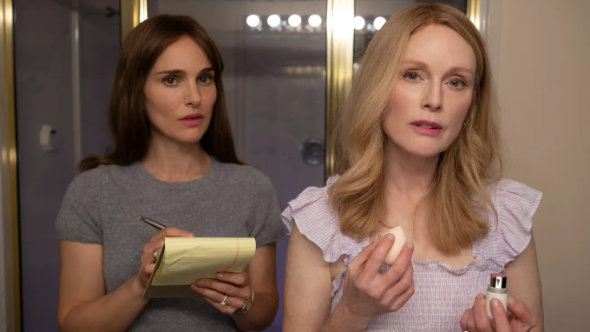
Todd Haynes reunites with Julianne Moore, the star of his 1995 film Safe, for what Time’s Stephanie Zacharek thinks is a “twisty, tricky drama, shot through with dark, glittering threads of comedy.” Written by Samy Burch, the drama catches up with Moore’s Gracie two decades after her tabloid “romance” with a 13-year-old Joe captured the nation’s attention and sent her to prison. She’s now married to Joe (Charles Melton), and their life with their kids has settled into a sort of normalcy, until Natalie Portman’s Elizabeth, an actress hired to play Gracie in a movie about the affair, arrives to do research for her role. “I found May December to be a wicked, complex delight, weird and clever and just humane enough to rescue itself from bleakness,” writes Vanity Fair critic Richard Lawson. The Telegraph’s Tim Robey sees a “teasing, ticklish, fascinatingly layered study of our defined identities and the isolation that comes with them,” and. Variety critic Peter Debruge agrees it’s “as layered and infinitely open-to-interpretation as any of his films, it’s also the most generous and direct.”
Monster (Kaibutsu)
Drama/Thriller | Japan | Directed by Hirokazu Koreeda
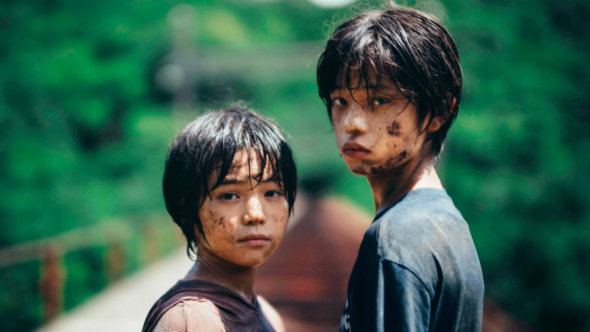
Since winning the Palme d’Or in 2018 for Shoplifters, Japanese director Hirokazu Kore-eda has made a film in France (The Truth) and South Korea (Broker, which was just added to Hulu). His return to Japan finds him working for the first time since 1995’s Maborosi with someone else’s screenplay—which appears to have been a great decision given Yuji Sakamoto’s win for Best Screenplay. It’s a story told from three different perspectives—those of a mother, a teacher, and a son. “As the perspectives converge, a tale of queasy tenderness begins to emerge, about the way friendship, love, shame, and rejection so often live on the same continuum,” writes Bilge Ebiri of Vulture, who adds, “I’m not sure I’ve seen a better film about the indisputable (and increasingly relevant) fact that we never really know what someone else is going through.” Vanity Fair’s Richard Lawson is also impressed, “Kore-eda does not hold back on big feelings. There is a profound drama at the center of the film, a dawning acceptance of self lyrically rendered.” In the eyes of Cinevue’s John Bleasdale, the “care and empathy with which the director and writer, as well as the performers, extend to all corners of the piece is extraordinary.”
Perfect Days
Drama | Japan | Directed by Wim Wenders
Neon is currently in talks to acquire the film for a theatrical release
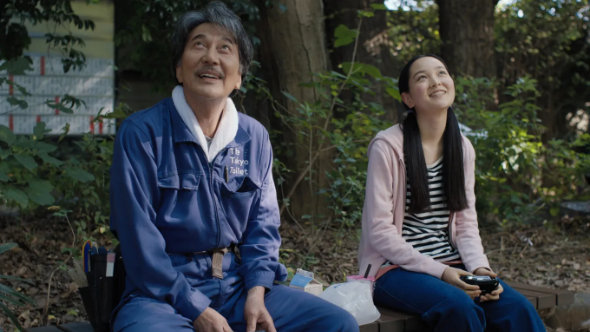
Winner off the Palme d’Or in 1984 for Paris, Texas and best director in 1987 for Wings of Desire, Wim Wenders was back in the main competition this year with a film originally commissioned as a short celebrating Tokyo’s state-of-the-art public toilets. Co-written with Takuma Takasaki, this unassuming film stars Best Actor winner Kôji Yakusho (Shall We Dance, Eureka, 13 Assassins) as Hirayama, a man content cleaning toilets and enjoying his passion for music and books. The Guardian’s Peter Bradshaw finds it a “little too subdued” but “engaging enough,” but In his review for Variety, Guy Lodge admires a film that’s “sincere and unassuming, and owns its sentimentality with good humor.” For THR critic David Rooney, this “eloquent and emotionally rich” drama is “disarming in its absence of cynicism.” And Vulture’s Bilge Ebiri praises Yakusho: “In a role almost entirely void of dialogue, the veteran actor (and the film’s co-producer) finds the words where there are none, translating with small glances what no intricate lines ever could.”
The Pot-au-Feu (La Passion de Dodin Bouffant)
Drama | France | Directed by Tran Anh Hung
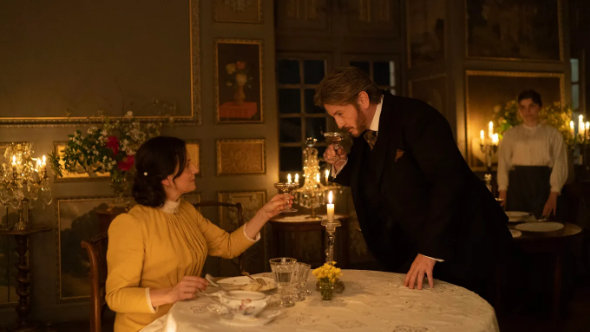
Winner of the Camera d’Or in 1993 for The Scent of Green Papaya, Vietnamese director Tran Anh Hung returned to the main competition and took home the Best Director prize for this imagined prequel to Marcel Rouff’s novel, The Life and Passion of Dodin- Bouffant, Gourmet. Set in 1885, the film delves into the relationship between chef Dodin Bouffant (Benoît Magimel) and his peerless kitchen partner Eugenie (Juliette Binoche). Don’t go to this one hungry. “Tran, a practised sensualist, is superb at depicting food as a vehicle for pleasure,” according to Robbie Collin of The Telegraph, and THR critic Jordan Mintzer agrees the movie “captures its mouthwatering dishes like edible tableaux, combining culinary marvels with a moving tale of middle-age love.” For TimeOut’s Phil de Semlyen, it’s a “gastronomic feast so rich and romantic, it’ll leave you woozy.” And in his review for Variety, Guy Lodge writes, “The Pot au Feu … holds its audience entirely on the pleasures of beauty, vicarious indulgence and, eventually, the human care inherent in haute cuisine, all to obviously mouthwatering but less expectedly moving effect.”
Robot Dreams
Animation/Drama | Spain/France | Directed by Pablo Berger
Acquired at Cannes by Neon for an undisclosed amount
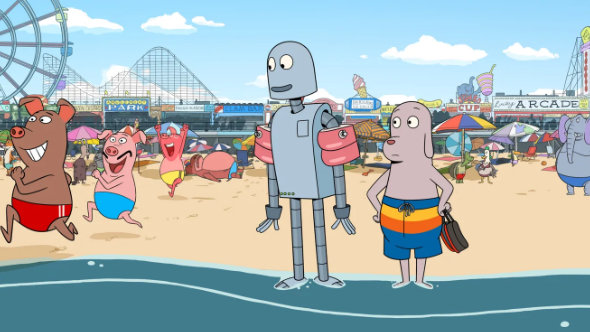
The first animated film from Spanish director Pablo Berger (Blancanieves, Torremolinos 73) is an adaptation of Sara Varon’s 2007 graphic novel about the friendship between a dog and a robot in 1980s New York City. While the the sound design in this dialogue-free movie impressed THR critic Leslie Felperin, overall it’s a “charming but patchy and sometimes slightly confusing work.” Screen Daily’s Tim Grierson admits it “may be sentimental, but it is also wise, resisting the urge to craft the sort of crowd-pleasing happy ending one might expect … for something truer.” Writing for IndieWire, Robert Daniels labels Robot Dreams a “delightfully bittersweet animated wonder that embodies the medium’s most purely cinematic qualities.” And in his review for The Playlist, Carlos Aguilar writes, “Its radiant colors and lucid conception of vulnerability in the face of a largely inconsiderate world, sink deep beneath the skin in the liminal space between the soul and the heart that can make animation such a wondrous medium.”
The Settlers (Los Colonos)
Drama/Western | Chile/Argentina/France/Denmark/UK | Directed by Felipe Gálvez Haberle
Acquired at Cannes by MUBI for a theatrical release (date tbd)
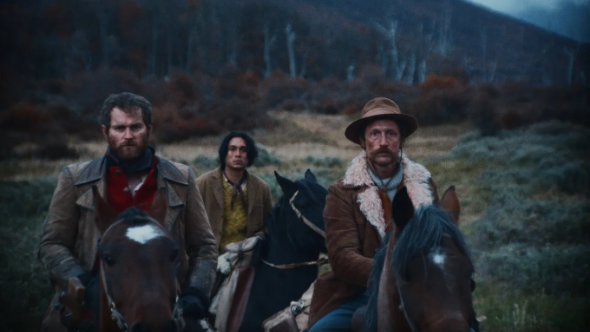
Co-writer (with Antonia Girardi) and director Felipe Gálve’s debut feature delves into Chile’s forgotten history of genocide, capturing the massacre of the indigenous Selk’nam people in south Patagonia. Hired by landowner José Menéndez (Alfredo Castro) to clear a path to the Atlantic Ocean, three men—a mercenary cowboy, a British private, and mixed-race horseman—set-out to “civilize” the territory. Screen Daily’s Wendy Ide believes the film “shows promise: it’s the work of a daring director intent on developing a distinctive and original voice,” and Jordan Raup of The Film Stage thinks the “riveting second half … brings profound expansion” to the “narratively opaque and formally ornate” earlier passages. IndieWire critic Christian Blauvelt declares The Settlers to be “one of the most chilling art-Westerns to come along in some time,” and The Playlist Carlos Aguilar adds, “With the grittily stylized The Settlers, an artist obliterates all sugarcoating to exhibit a burdensome truth.”
Other notable films (good, but not quite great)
The Animal Kingdom (Le Règne animal)
Adventure/Sci-fi/Horror/Drama | France | Directed by Thomas Cailley
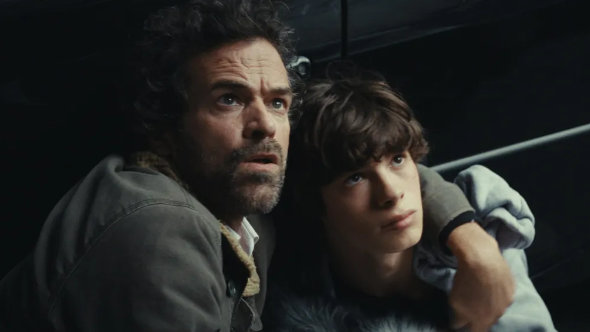
French filmmaker Thomas Cailley’s pandemic-filmed second feature didn’t go home from Cannes with a handful of awards like his 2014 debut (Love at First Fight) did, but that doesn’t mean that critics disliked the ambitious genre-mashup Animal Kingdom. The new film is set in a world where humans are mysteriously mutating into animals—including the wife of François (Romain Duris). That prompts the latter to take his 16-year-old son (Winter Boy‘s Paul Kircher, whose performance here is a highlight) on a quest for a cure that will save his wife. The Playlist’s awards columnist Gregory Ellwood is one of the few critics who didn’t enjoy the film, finding its meaning only surface deep and Cailley’s too-conventional aesthetic “often akin to a contemporary streaming movie” (which is not meant as a compliment). But The Hollywood Reporter’s Leslie Felperin thinks the visual effects are one of the joys of an “original and striking work” marred only by some pacing issues and symbolism that’s “a little too on the nose,” though she feels that a bigger-budget American remake is inevitable. In Screen Daily, Jonathan Romney also has praise for this “bold, altogether wild-up genre mash-up” that’s “[r]ippling with visual invention.”
Asteroid City
Comedy | Spain | Directed by Wes Anderson
Opens in theaters June 16 via Focus Features
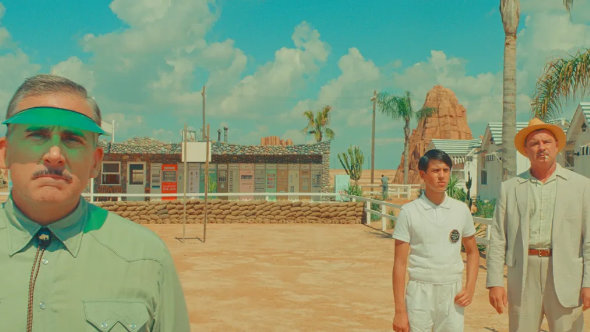
Much like 2021’s The French Dispatch, the latest from Wes Anderson has both strong supporters and major detractors. Asteroid City‘s vast ensemble (Jason Schwartzman, Scarlett Johansson, Tom Hanks, Jeffrey Wright, Tilda Swinton, Bryan Cranston, Edward Norton, Adrien Brody, Liev Schreiber, Hope Davis, Stephen Park, Rupert Friend, Maya Hawke, Steve Carell, Matt Dillon, Hong Chau, Willem Dafoe, Margot Robbie) is spread across two narrative planes: one with the parents, children, teachers, and others in a colorful, desert town visited by aliens, and a second featuring actors playing these characters in a black-and-white teleplay. THR’s David Rooney believes “the movie mostly just sits there, never really accumulating much life,” and in the opinion of Variety critic Owen Gleiberman “Asteroid City looks smashing, but as a movie it’s for Anderson die-hards only, and maybe not even too many of them.” Positive notice comes from Luke Hicks of The Film Stage, who declares it “an absolute delight, Anderson’s best since The Grand Budapest Hotel.” And for Vanity Fair critic Richard Lawson it’s “an oddly moving film” that paints a “mural of everyday humanity, all its quiet passion and accidental humor.” Vulture’s Bilge Ebiri thinks the “audacity and beauty of Asteroid City lie in the way it connects the mysteries of the human heart to the secrets of science and the universe,” and in his review for Polygon, Isaac Feldberg adds, “It’s Wes Anderson at his most mature and magical.”
Banel & Adama
Drama | Senegal/Mali/France | Directed by Ramata Sy
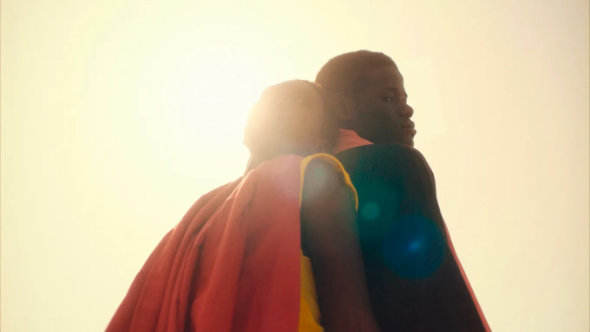
The only debut feature playing in competition at Cannes this year is a love story set in a remote village in northern Senegal by writer-director Ramata-Toulaye Sy. Banel and Adama are a young married couple who defy tradition when Adama refuses to become tribal chief, preferring to spend his time with his wife. But when drought strikes the village, blame lands on Banel. The Guardian’s Peter Bradshaw believes it’s an “impressive piece of work from a natural film-maker,” but with a narrative better suited for a short film. Lovia Gyarkye of THR agrees, writing, “Ramata-Toulaye Sy has conjured a stunning world in need of a sharper story.” TheWrap’s Steve Pond is more enthusiastic, claiming the film “has the feel of an exquisite miniature, succinct and evocative.” And in her review for IndieWire, Sophie Monks Kaufman declares it a “striking debut that puts Sy on the map as a purveyor of deceptively gorgeous visions that show flimsy desires at the mercy of the social, and literal, weather.”
The Book of Solutions (Le Livre des solutions)
Comedy/Drama | France | Directed by Michel Gondry
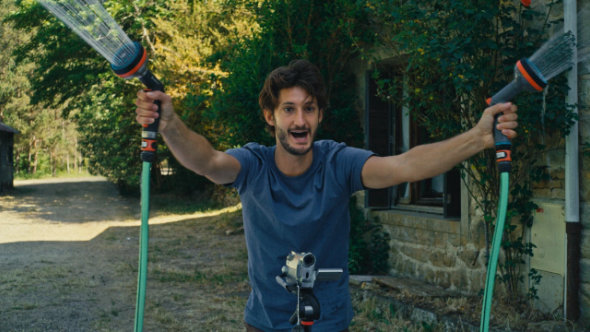
Quirky director Michel Gondry (Eternal Sunshine of the Spotless Mind) brought his first film in eight years to the Directors’ Fortnight, where critics found it flawed but not without some merits. The French-language dramedy Solutions centers on Gondry stand-in Marc (Pierre Niney), a bipolar filmmaker who is feuding with his producers over his current project. So with the help of his editor he grabs the footage and runs off to the French countryside where his aunt lives, hoping to complete the film there without distractions (much like the real Gondry did for his film Mood Indigo). Yet there are diversions aplenty—and with his mind once again full of ideas, he begins to pen a book. In The Hollywood Reporter, Sheri Linden finds some “delights” in the film but cautions, “On the way to its mildly satisfying final punchline, this uneven comedy loses its thread.” In IndieWire, a slightly more appreciative David Ehrlich feels, “The pleasure that Gondry takes in telling a plot-light story that’s driven by pure invention is both palpable and contagious,” though he adds that “It’s a shame that ‘The Book of Solutions’ eventually settles into a traditional narrative arc,” since Gondry’s enthusiasm for storytelling appears to be minimal. And The Playlist’s Elena Lazic even appreciates how “disjointed” the movie comes off: “it is refreshing and endearing to watch as Gondry lets his protagonist, a version of himself, go to the end of his thoughts, even if they apparently lead nowhere.”
The Breaking Ice
Drama | China | Directed by Anthony Chen
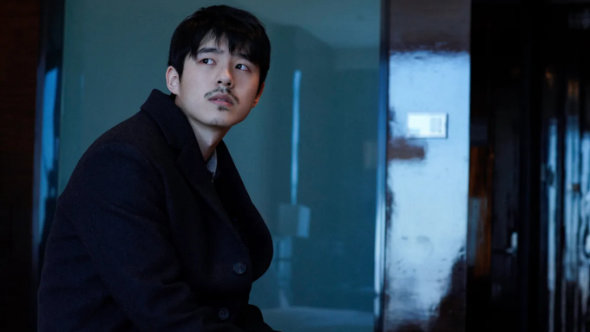
Ten years ago, writer-director Anthony Chen won the Cannes Camera d’Or (best first feature) for Ilo Ilo. This year he returned in the Un Certain Regard section of the festival with an intimate story set in Yanji, a city on China’s border with North Korea. Haofeng, visiting from Shanghai, meets Nana, his tour guide, and her friend Xiao. Bonding quickly, the threesome set out for Heaven Lake, a volcanic crater lake atop Paektu Mountain. For The Guardian’s Peter Bradshaw, Ice is “not as absorbing or fully realised as [Ilo Ilo],” despite “tremendous” performances from the three leads and the filmmaker’s “warmth, sympathy and directness.” IndieWire critic David Ehrlich sees a “sweet and shimmeringly beautiful film about how life can flow and then freeze and then thaw into something entirely new if you let it,” and David Rooney of THR believes the “closing notes of hope and renewal are lovely.” For The Playlist, Jeff Zhang writes, “Chen’s feature-length return to Cannes is a daring experiment that pays off handsomely, an exploration of the entire spectrum of a generation’s hopes, dreams, and anxieties through a laser-focused milieu. Its interweaving of powerful performances and spiritual complexity, eventually melded with local folklore, is nothing short of beautiful.”
Homecoming (Le retour)
Drama | France | Directed by Catherine Corsini
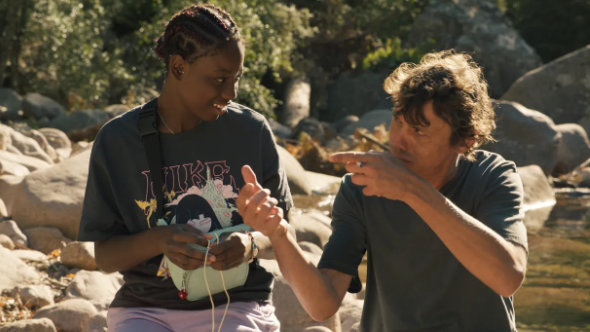
After being in the main competition with The Divide in 2021, Catherine Corsini (Summertime) returned this year with controversy surrounding her latest, the story of Khédidja (Aïssatou Diallo Sagna) and her two daughters, who return to Corsica after leaving 15 years earlier under tragic circumstances. The final edit of the film did not stir up any issues for critics, who roundly praised the performances. But some reviewers are underwhelmed by the narrative, including Variety’s Guy Lodge, who writes, “A terrific trio of performances go some way toward making the film’s more neatly schematic plotting feel organically, messily human.” LA Times critic Justin Chang believes “Corsini leans a little too hard on narrative convenience, but she also has a gift for illuminating everyday racism,” adding, “whenever believability falters, Corsini and her fine actors manage to pull you back in.” THR’s Jordan Mintzer calls Homecoming “one of her finest movies in a long time” and a “moving and meaningful summer holiday.” And in his review for TheWrap, Ben Croll writes, “Corsini has delivered a wonderful film, a beautifully calibrated coming-of-age drama that ever so elegantly flutters questions of race, class, guilt and opportunity through a seaside summer breeze.”
In Our Day
Drama | South Korea | Directed by Sang-soo Hong
Acquired at Cannes by Cinema Guild for a release in theaters in 2023 (date tbd)
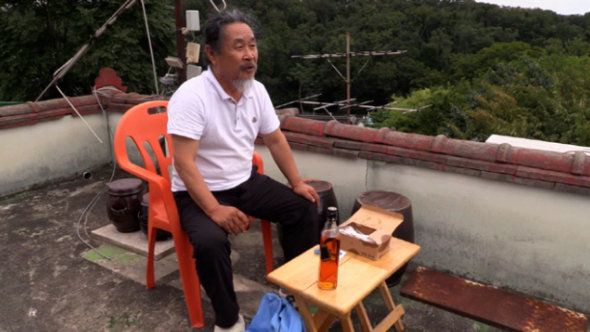
The closing-night film of the Directors’ Fortnight section has only received two reviews at press time. The latest from prolific Korean filmmkaer Hong Sangsoo is a loosely plotted pair of tales (or, really, conversations) centering on two well-known artists. One is an actress (Kim Min-hee) who is approached for advice by an amateur; the other is an elderly poet (Ki Joo-bong) who welcomes a fan. Screen Daily’s Jonathan Romney advises that In Our Day is “one of Hong’s most narratively spare films – if this conversation piece can be said to contain narrative at all.” He admits that sparseness “won’t earn Hong any new fans, but avid followers will enjoy its elusive felicities and love puzzling over its enigmatic gaps.” And in a “B–” review, The Playlist’s Rafaela Sales Ross labels the film “a perhaps too unhurried but very charming insight into being.”
Kidnapped (Rapito)
Drama | Italy/France/Germany | Directed by Marco Bellocchio
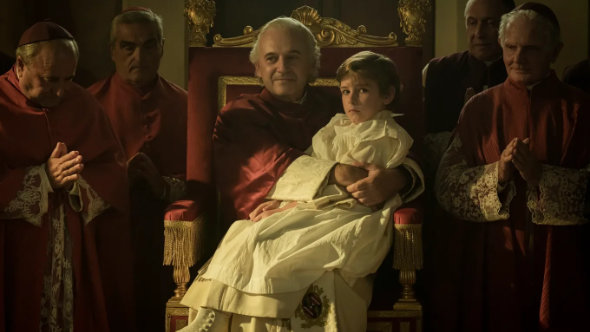
A presence at international festivals since 1965 and in Cannes since 1980 (his most recent competition title being 2019’s The Traitor), Italian writer-director Marco Bellocchio took inspiration from a true story for his latest film, a dramatization of the 1858 kidnapping of Edgardo Mortara, a six-year-old Jewish boy, by the Catholic Church. Taken to Rome, he was raised Catholic under Pope Pius IX. The film plays “more like a heavy sigh than an absorbing adaptation of history,” according to Luke Hicks of The Film Stage, and TimeOut’s Phil de Semlyen finds it “juicily told but psychologically sketchy.” More positive, Screen Daily critic Lee Marshall sees a “sinewy period piece,” and The Guardian’s Peter Bradshaw admits to be “thrilled to this movie,” which to him is “a gripping, heartbreaking true-political crime story” and “already looks like a classic.”
Kubi
Drama/Action | Japan | Directed by Takeshi Kitano
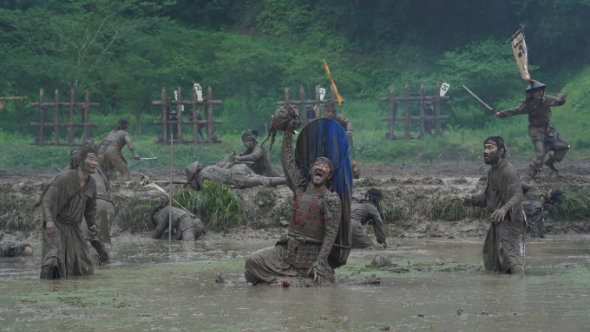
For the first time since 2003’s The Blind Swordsman: Zatoichi, Takeshi Kitano makes a bloody return to the samurai genre with this adaptation of his own 2019 novel about warlords battling each other for control of 16th century Japan. Writing for IndieWire, Siddhant Adlakha admits that Kubi’s “eye-popping, blood-soaked vistas are a marvelous sight, as are a number of its era-specific details,” but warns that the film unfortunately “loses nearly all momentum in its second half, before settling into a rote, repetitive rhythm.” But according to Ian Murray of The Playlist, “Kitano stages this blood-soaked epic with the intoxicating energy of an artist who’s only just getting started,” and, finding it “often wildly funny,” And TimeOut’s Phil de Semlyen claims it’s “like Kurosawa on nitrous.”
The New Boy
Drama | Australia | Directed by Warwick Thornton
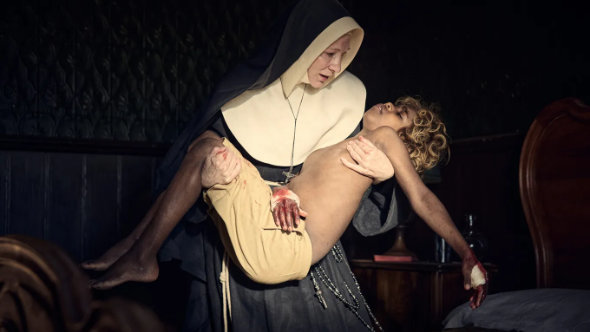
The latest from writer-director-cinematographer Warwick Thornton (Sweet Country, Samson and Delilah) takes place in 1940s Australia where a 9-year-old Aboriginal boy (Aswan Reid) is taken in by a nun (Cate Blanchett) at a rural orphanage. For Variety’s Guy Lodge, this “thoughtful magical-realist fable,” inspired by “Thornton’s own experience of growing up as an Aboriginal boy in a Christian boarding school,” is “ambitious, tonally tricky filmmaking.” According to Anna Bogutskaya of The Playlist, “The film never returns to the strength of its opening scene, and by the end, the spark is gone.” And Collider’s Therese Lacson thinks that “where Thornton’s narrative falters, his camerawork and directorial eye are stronger than ever.” TheWrap’s Steve Pond is more positive, writing, “There’s not a lot of clarity here, but there is a terrible, strange beauty in the film’s mixture of ritual, magic, faith and the dark side of colonialism.” And in her review for IndieWire, Ella Kemp calls The New Boy a “sweeping and poetic portrait of stifled faith and the threat of monopoly on religion.”
Occupied City
Documentary | Netherlands/UK | Directed by Steve McQueen
Will be released in theaters by A24 (date tbd)
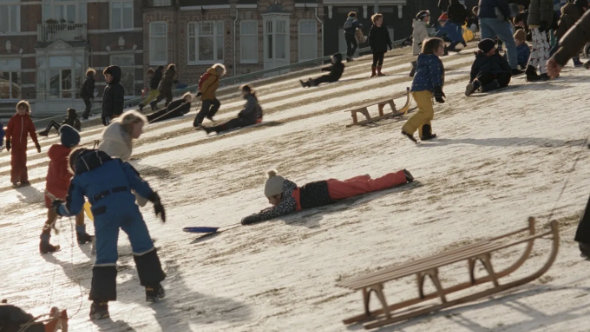
The Zone of Interest wasn’t the only 2023 Cannes entry to focus on the Holocaust in a novel fashion. Steve McQueen’s four-hour-plus documentary on the Nazi occupation of Amsterdam was inspired by his wife Bianca Stigter’s book Atlas of an Occupied City (Amsterdam 1940-1945). Stigter, a Dutch journalist, is also the director of Metacritic Must-See Three Minutes: A Lengthening, a haunting look at the Jewish inhabitants of Nasielsk, Poland before the Holocaust. McQueen’s film juxtaposes narration by Melanie Hyams with vignettes of contemporary Amsterdam life, chronicling in door-to-door detail the ghosts of the past that still haunt the city. It’s an approach that didn’t work for Variety’s Owen Gleiberman, who cautions, “The film is a trial to sit through, and you feel that from almost the opening moments.” Luke Hicks of The FIlm Stage similarly concludes, “Steve McQueen’s first documentary feels more like an unedited podcast with dizzying visual accompaniment than a feature film.” But Manohla Dargis of The New York Times finds it “heroic in scope and ambition,” and for Los Angeles Times critic Justin Chang this is “vital cinema from a filmmaker with one eye on the not-so-distant past and the other on our precarious future.”
The Old Oak
Drama | UK/France/Belgium | Directed by Ken Loach
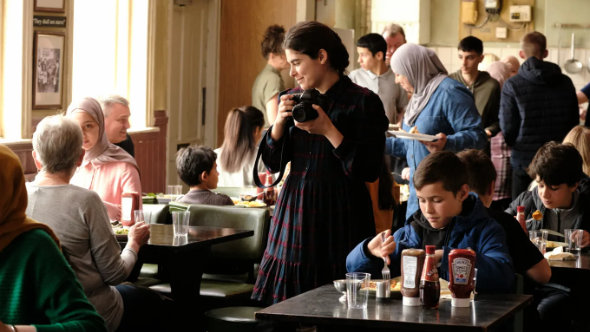
Winner of the Palme d’Or in 2006 for The Wind that Shakes the Barley and 2016 for I, Daniel Blake, Ken Loach returned to Cannes—likely for the final time—with this story of TJ Ballantyne (Dave Turner), a struggling pub owner who opens his doors to newly arrived Syrian refugees and strikes up a friendship with Yara (Ebla Mari), an avid photographer. It might be Loach’s last film, but Justin Chang of the LA Times hope’s it isn’t “because it’s terrible to save the worst for last.” The Guardian’s Peter Bradshaw also hopes it’s not his final film, but for a different reason, “[Loach] has concluded with a ringing statement of faith in compassion for the oppressed.” Falling in between those two opinions, THR critic Jordan Mintzer finds it “compassionate if a bit schematic at times.” And Variety’s Owen Gleiberman thinks it starts out strong and the performances of Turner and Mari have pain and soul. But this is the last movie that should be turning into a Kumbaya progressive fairy tale.” Backing the director to the end is Screen Daily critic Jonathan Romney: “An intimate but ambitiously mounted ensemble piece, The Old Oak ranks among Loach’s foremost state-of-the-nation dramas.”
The Sweet East
Drama | USA | Directed by Sean Price Williams
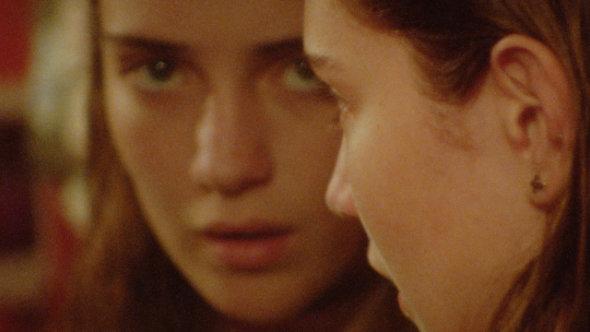
Cinematographer Sean Price Williams (Funny Pages, Her Smell, Good Time) makes his feature directing debut with this story about Lillian (Talia Ryder), a high school student who runs away during a school trip only to find herself encountering an array of radicalized believers living in their hermetic worlds. Written by Nick Pinkerton and also starring Simon Rex, Earl Cave, Jacob Elordi, Jeremy O Harris, and Ayo Edebiri, The Sweet East is “fun and hot, smart and dumb, a total blast,” says Rory O’Connor of the The Film Stage. In her review for The Playlist, Rafaela Sales Ross praises the casting as well as “the marriage between Pinkerton’s deliciously caustic writing and Williams’ immersive eye for imagery.” Over at /Film, Lex Briscuso express similar leanings: “The film is on point with its incredibly smart casting, and that victory aids in fully shaping the world Price Williams and Pinkerton concocted in their zany witch’s cauldron.” Less enthusiastic, Screen Daily’s Tim Grierson praises Talia Ryder’s “magnetic performance” but finds the film “amusing and electric but mostly uneven.”
Tiger Stripes
Drama/Comedy/Horror | Malaysia/Taiwan/Singapore/France/Germany/The Netherlands/Indonesia/Qatar | Directed by Amanda Nell Eu
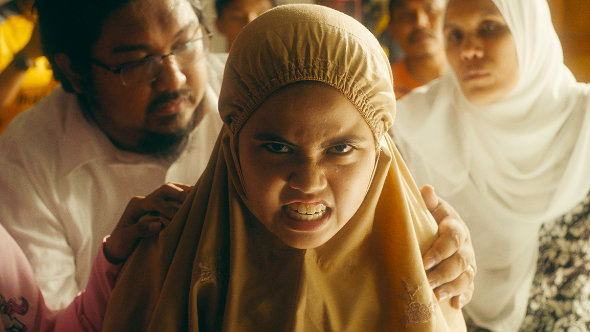
Malaysian filmmaker Amanda Nell Eu’s debut feature took home the Grand Jury Prize as the top film in Cannes Critics’ Week competition. Tiger Stripes follows Baffin, a 12-year-old girl who is ostracized by her friends and her strict Muslim community when her body begins to change. Writing for IndieWire, Adam Solomons claims it’s a “well-made, eminently watchable illustration of the “monster” that so many young girls are told to see themselves as.” Screen Daily’s Fionnuala Halligan admits there are parts that “feel unsophisticated,” but ultimately decides that, overall it’s a “striking” debut. And Elena Lazic of The Playlist agrees, praising this “zesty” debut for its “playful, imaginative approach to its metaphorical structure and its ultimate faith in human nature.”
Youth (Spring)
Documentary | France/Luxembourg/Netherlands | Directed by Bing Wang
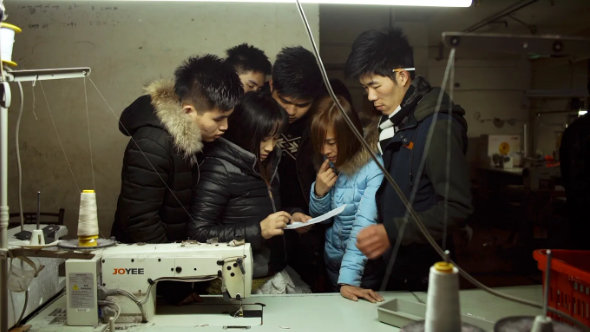
Filmed between 2014 and 2019 in the Chinese city of Zhili, Wang Bing’s three-and-a-half-hour documentary on the lives of young textile workers isn’t even half the length of his 2018 doc Dead Souls, but it is still a “giant, immersive documentary,” in the eyes of The Guardian’s Peter Bradshaw. For TimeOut critic Dave Calhoun, “Wang’s film feels less like an exposé than an eye-opener; a portrait of a reality that feels almost otherworldly in its distance and difference.” THR critic Leslie Felperin adds, “At a film festival sometimes more concerned about who’s wearing what on the red carpet, this provides a sobering reflection on another aspect of the world of fashion.”
The disappointments
Black Flies
Drama/Thriller | USA | Directed by Jean-Stéphane Sauvaire
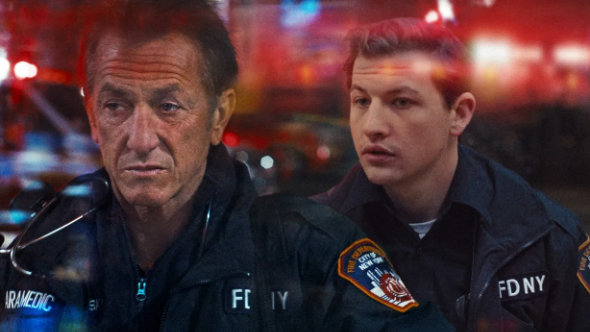
Jean-Stéphane Sauvaire directs Sean Penn and Tye Sheridan in this adaptation of Shannon Burke’s 2008 novel, co-written by Ben Mac Brown and Ryan King. Sheridan plays a young paramedic in New York who’s paired with Penn’s veteran EMT in what The Telegraph’s Tim Robey calls an “arrestingly grim” story that is “not free of clichés” but “actually gains an added soul-sickness from being stuck with them as everyday realities.” Rafaela Sales Ross of The Playlist finds “plenty of nihilistic entertainment” but a lack of depth in the film’s “formulaic confines,” and Variety critic Owen Gleiberman describes it as a “free-floating nihilist carnival of social breakdown” that “ isn’t much fun to sit through” because “for all its grungy surface authenticity, is a bit of a fake.” Commenting on the film’s bleakness, IndieWire’s David Ehrlich claims “it’s a movie that wants to make Bringing Out the Dead feel like Barb and Star Go to Vista del Mar.”
A Brighter Tomorrow (Il sol dell’avvenire)
Drama/Comedy | Italy | Directed by Nanni Moretti
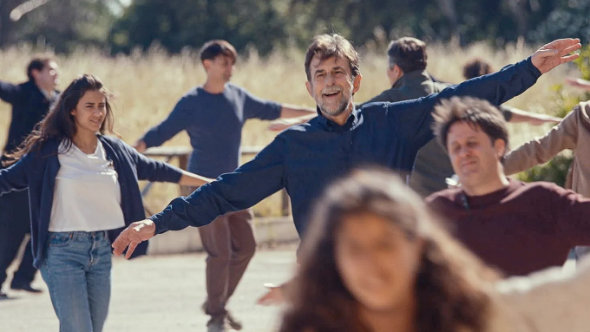
Italian filmmaker Nanni Moretti won the Palme d’Or in 2001 for The Son’s Room. Tomorrow is his ninth feature to compete at Cannes, and it finds Moretti directing, co-writing and starring as Giovanni, a filmmaker struggling with his marriage (to Margherita Buy), his producer (Mathieu Amalric) and a changing industry. “What’s missing here is a chief ingredient that Moretti’s earliest films had in spades: self-deprecating irony,” laments Leonardo Goi in The Film Stage. For THR critic David Rooney, the “film’s wistful hope for the future of cinema and its healing power ends up being too self-satisfied to register as an expression of collective faith.” And The Guardian’s Peter Bradshaw claims it’s “bafflingly awful: muddled, mediocre and metatextual – a complete waste of time, at once strident and listless. Everything about it is heavy-handed and dull: the non-comedy, the ersatz-pathos, the anti-drama.”
Club Zero
Drama/Thriller | Austria/UK/Germany/France/Denmark | Directed by Jessica Hausner
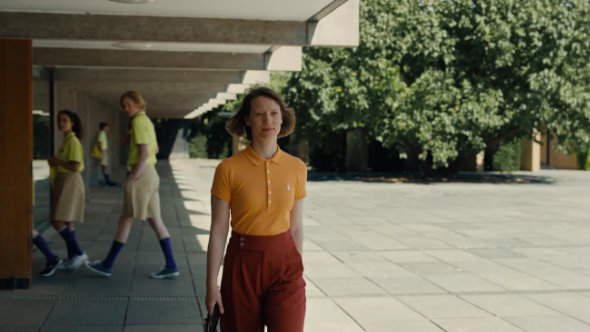
Austrian filmmaker Jessica Hausner’s second film to play in competition at Cannes, following 2019’s Little Joe, divided critics. For Variety’s Owen Gleiberman, this “supremely audacious and disturbing eating-disorder thriller,” is “an even more gripping and provocative mind-fuck” than her last film. Set at a boarding school where a new teacher (Mia Wasikowska) instructs her students to eat less, leading to dire circumstances, Club Zero is “exasperating and baffling,” according to Peter Bradshaw of The Guardian, who believes it’s “another miss” from a “very talented film-maker.” Screen Daily critic Wendy Ide finds it “cautious and restrained to a fault” and a “thinly-written picture that operates on a largely superficial level.” And IndieWire’s David Ehrlich writes, “It’s always been hard not to admire Hausner’s audacity, but this time around the boldness of her storytelling finally spills into trollish provocation.”
Elemental
Animation/Family | USA | Directed by Peter Sohn
Opens in theaters June 16 via Disney/Pixar
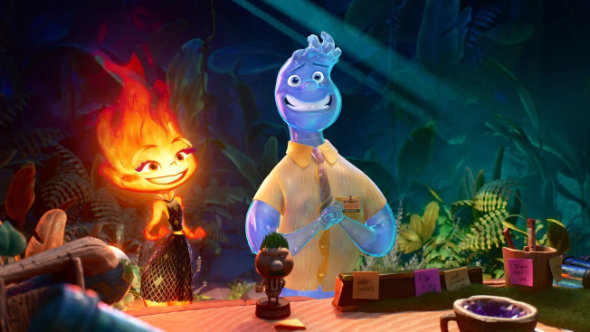
Pixar’s latest feature made its world premiere as the festival’s closing-night gala presentation, but it proved to be one of the animation studio’s least impressive films to date. Directed by Peter Sohn (The Good Dinosaur), Elemental sets a story that’s effectively about immigration and diversity (with a romance mixed in for good measure) in a fantastical city where members of the various “elements”—water, fire, air, and land—live together. Finding a lack of originality, The Hollywood Reporter’s Jordan Mintzer feels that the film is so efficient in hitting all of its expected beats that “Elemental may be the first work from Pixar to feel like it was generated entirely by AI.” Variety’s Peter Debruge also thinks that Elemental “feel[s] like a misfire,” adding that in spite of some fun visual details, “[T]he whole scenario seems forced: so much world-building to tell a story better suited to flesh-and-blood human characters.” But while IndieWire’s Siddhant Adlakha also sees some “confused and overstuffed worldbuilding,” “mixed metaphors,” and “mal-formed mechanics,” he concludes, “Elemental has enough charming moments to get by, even if its meaning lies less in its ill-conceived immigrant saga, and more in the personal drama that lives a few layers beneath it.”
Firebrand
Drama/Horror | UK | Directed by Karim Ainouz
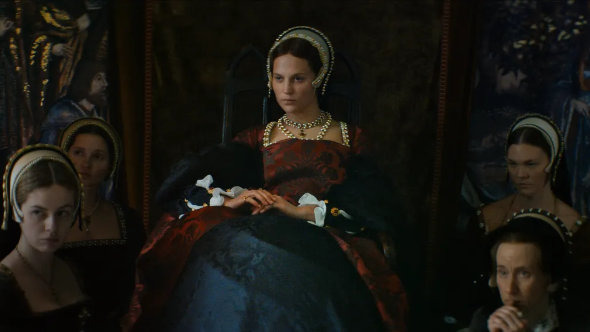
Karim Aïnouz’s last film, Invisible Life, won the top prize in the Un Certain Regard section of the 2019 festival. Moving into the main competition this year, Aïnouz makes his English-language debut with this period drama starring Alicia Vikander as Katherine Parr, the sixth and last wife of King Henry VIII, played by Jude Law and his very special perfume. For Collider’s Therese Larson, a “messy story and confusing characters” result in a “disappointment” despite “how exquisite the film looks.” Firebrand feels “like a familiar tale of court intrigue,” according to David Ehrlich of IndieWire, admitting that even Law’s “riveting and revoltingly bellicose take on Henry VIII” isn’t “enough to supply Firebrand with its missing spark.” The Guardian’s Peter Bradshaw believes Law “outrageously steals every scene” in this “watchable piece of faux history,” and Tim Robey of The Telegraph agrees that “Law is horribly good.” Supporting the film, THR critic David Rooney writes, “For fans of historical drama with edge and vitality, this one’s very much worth your time.”
The Idol
TV/Drama | USA | Directed by Sam Levinson
Debuts June 4 on HBO and Max

Only a handful of TV shows (including the recent Twin Peaks revival) have ever premiered at Cannes, but don’t mistake that for a sign of quality; The Idol just might be the worst show in HBO history. (Yes, we are aware that Arli$$ exists.) Premiering at the festival following delays, a ballooning production budget, a director change, and even more controversy and torture-porn allegations, HBO’s six-episode, darkly comedic and at times graphic music industry drama series from Euphoria‘s Sam Levinson and Grammy-winning recording artist Abel Tesfaye (aka The Weeknd) follows an up-and-coming pop star (Lily-Rose Depp) who suffers a nervous breakdown while on tour and then attempts to restart her career with the help of a mysterious nightclub owner (Tesfaye).
What do critics see in the first two episodes that screened at Cannes? “Cowardice and bullshit” are just two of the labels applied by The Daily Beast’s Caspar Salmon, who adds, “The show’s sleaze (intentional and not) would be one thing, but it’s the hideous, self-excusing presentation of rape culture that rankles.” At Rolling Stone, David Fear echoes that “sleaze” label and warns, “The double-dose the festival screened felt nasty, brutish, much longer than it is, and way, way worse than you’d have anticipated.” In the Los Angeles Times, critic Mary McNamara addresses the allegations against the show and notes, “The term ‘porn’ is not inaccurate, though it’s tough to imagine anyone would consider any of the action erotic when it is so ham-fisted. And in The Playlist, Robert Daniels sums up The Idol as “crude, gross, and sexist,” while noting that the series “lacks the requisite self-awareness to be much of anything, really.”
Indiana Jones and the Dial of Destiny
Action-adventure | USA | Directed by James Mangold
Opens in theaters June 30 via Walt Disney Studios
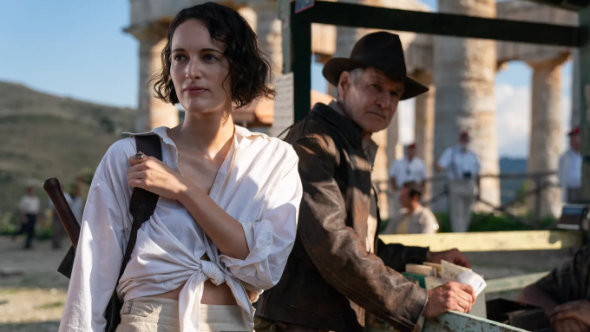
Director James Mangold (Logan, Ford v Ferrari) takes the whip from Steven Spielberg for this fifth (and reportedly final) entry in the Indiana Jones franchise. Harrison Ford returns (both de-aged and of-age) as the snake-fearing archaeologist, and this time he’s joined by friends both old (John Rhys-Davies briefly returns as Sallah) and new (Phoebe Waller-Bridge, Antonio Banderas, Toby Jones) to face off against a new Nazi foe (Mads Mikkelsen) in search of Archimedes’ titular dial. Unfortunately, this final globe-trotting adventure turned out to be more Indiana Jones and the Kingdom of the Crystal Skull than Raiders of the Lost Ark. Writing for Polygon, Ian Murray declares it a “disappointing facsimile” that is a “painful reminder of how good we used to have it,” and IndieWire’s David Ehrlich thinks this “empty slog of a movie” is “an almost complete waste of time.” THR critic David Rooney also finds it “an exhausting slog,” while Variety’s Owen Gleiberman calls Dial a “dutifully eager but ultimately rather joyless piece of nostalgic hokum.” But the fifth film did have a few defenders, including Bilge Ebiri of Vulture who calls the film “fun” and “too entertaining to dismiss,” and Total Film’s James Mottram, who proclaims this “terrific thrill ride” to be “a highly satisfying blend of action, humour and emotion.”
Jeanne du Barry
Drama | France | Directed by Maïwenn
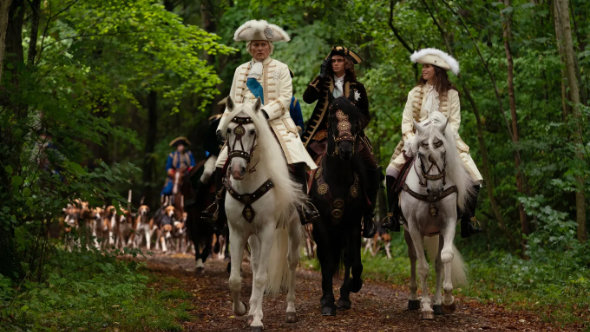
With a director who admitted to spitting in a journalist’s face and star whose trial has been in the tabloids for months, this opening-night film was sure to get people talking. Unsurprisingly, that talk wasn’t all that positive. Maïwenn (My King, Polisse) directs, co-writes, and stars as Jeanne Vaubernier, a woman who used her wit and wiles to climb the social ladder of 18th century France and eventually capture the love of Louis XV (Johnny Depp). The film did have some supporters, including Geoffrey Macnab of The Independent, who believes Depp gives “one of his more restrained and effective performances” in this “subtle and well-crafted costume drama with plenty of satirical bite.” For Vanity Fair’s Richard Lawson, “the movie is as engaging as it is sinisterly ridiculous,” a “guilty entertainment, preening and ahistorical and basely compelling.” Los Angeles Times critic Justin Chang admits Jeanne du Barry is a “polished, well-made affair,” but also a “disappointingly juiceless one, with little of the messy go-for-broke filmmaking energy that Maïwenn has brought to better, rougher works.” THR’s Jordan Mintzer agrees it is “sumptuously made,” but Maïwenn and Depp, “like the movie, rarely get our pulse racing.” That opinion is echoed by Nicholas Barber at the BBC: “The combination of Depp and Maïwenn may have seemed like a dangerous one, but on this occasion they’re playing it safe.”
Last Summer (L’été dernier)
Drama/Thriller | France | Directed by Catherine Breillat
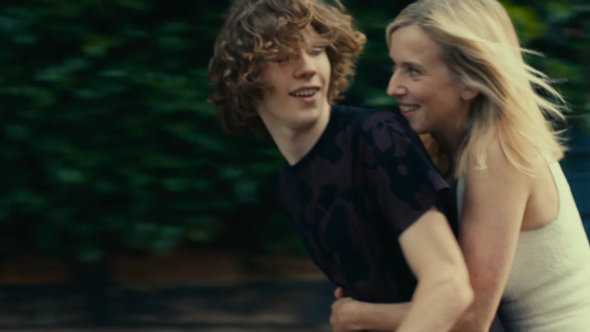
French director Catherine Breillat (Romance, Fat Girl, Sex Is Comedy) adapts May el-Toukhy’s multi-award-winning Danish film Queen of Hearts with Léa Drucker as Anne, a successful lawyer who has an affair with her 17-year-old stepson, Theo (Samuel Kircher). The Guardian’s Peter Bradshaw wonders why Breillat “felt she needed to direct her own moderate version,” when the “changes amount to smudging the original’s icy Scandi sheen, decreasing its erotic excitement, making the performances more laboured and thus leaving the story’s essential preposterousness dangerously exposed.” The Telegraph’s Robbie Collin believes Summer is a “poised and steely yet surprisingly tasteful remake,” with sex scenes that “feel oddly un-daring,” but Savina Petkova of The Film Stage disagrees on that latter point, claiming, “There are three sex scenes in the film, and all of them are magnificent.” Variety critic Peter Debruge is also positive on the film, writing, “It proves most daring in the ways the film departs from its more conventionally moralistic source, and especially in Breillat’s refusal to call either party a parasite.”
Lost in the Night (Perdidos en la noche)
Drama/Thriller | Mexico/Germany/Netherlands/Denmark | Directed by Amat Escalante
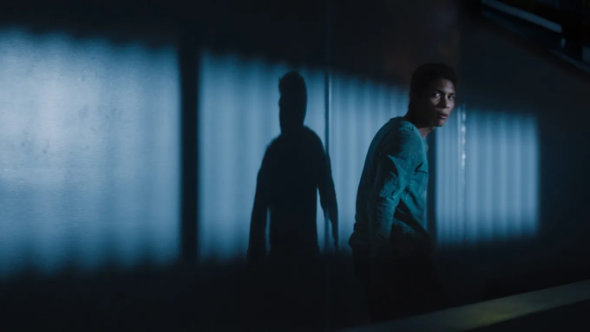
The fourth Cannes entry for Mexico-based director Amat Escalante (whose Heli won him the festival’s best director trophy in 2013) centers on Emiliano (Juan Daniel Garcia Trevino), a young man in a Mexican mining town whose investigation into the disappearance of his mother (one of a group of five suddenly missing activists) takes him into the home of a wealthy family. Unfortunately, Escalante’s first feature in seven years ” tries a great deal and ends up stretching itself thin,” according to The Film Stage’s Rory O’Connor. THR critic David Rooney finds Night to be the director’s “most accessible work to date” but also “a bit meandering and underpowered,” resulting in a film that’s “disappointingly conventional.” And Screen Daily’s Lee Marshall echoes that “conventional” label, adding that Night might disappoint Escalante fans “who signed up for the cold shower of Heli and the weird head trip of The Untamed.”
Want more Cannes?
View our ranking of every Cannes Palme d’or winning-film since 1990.
All photos courtesty of Cannes Film Festival and related festivals.
watch avatar the way of water full movie
watch avatar the way of water full movie
watch avatar the way of water full movie





